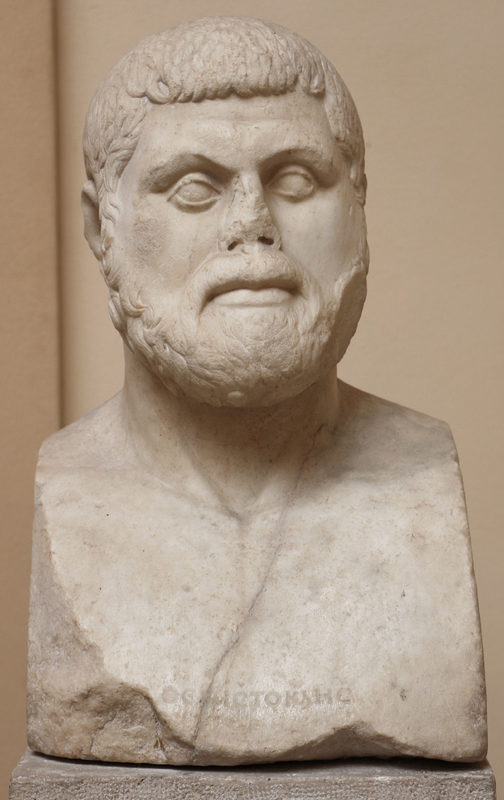Herm Bust of Themistokles
Title
Herm Bust of Themistokles
Date
5th century BC
Artist or Workshop
Unknown
Materials
marble
Height of the work
50 cm tall
Provenience
Ostia, in the House of Themistokles, near the Theater
Current Location
Museo Archeologico Ostiense (Archeological Museum of Ostia), Italy
Sitter Biography
Themistokles was an Athenian general at Salamis. The Battle of Salamis occurred in 480 BC as part of the Persian War. He was a skilled naval strategist and served as the archon of Athens starting in 493 BC. Themistokles was a strong proponent for using the Greek fleet made up of triremes in the Persian War. After the war Thermistokles did not get as much praise from the Athenians as one would think though the herm bust suggests that there were at least some that viewed him as a hero.
Description and Significance
Description:
The Herm of Themistokles is the bust of a man, showing only the head on top of a block of marble. The facial expression is very serious with the lips slightly downturned and slightly arched brows. His lips are partly slightly. He has a full beard though it is not very long. His hair and beard have a wavy texture. There is a deep line in his forehead. The ears, nose, and left side of the beard of the bust have been damaged. There is also a crack on the back of his head running from the top of the head to the bottom of the hairline. His eyes are deeply set back in their sockets creating a shadow under the brows. At the bottom of the bust Thermistokles's name is inscribed on the marble.
Significance:
This portrait is a Roman copy of a 5th century portrait. It is done in the Classical Greek style with common characteristics such as being naturalistic, minimal facial expression to crete something of a mask, and "typing". "Typing" refers to how Themistokles is depicted in the standard general type with some specific features such as his eyes, hair, and beard. It is mostly idealized or highlighting youthful qualities as there is not much age shown in the face, however the beard could suggest some age.
The herm bust is part of the genre of "Men of Action" portraits. The people that are depicted in these portraits are honored because of some service to the polis whether through the military or politics. In Thermistokles's case he was a heroic general at the Battle of Salamis. This battle is significant to the Greeks because it was a major victory for them during the Persian War and sparked Greek pride and thus Thermistokles is seen as a great war hero.
The Herm of Themistokles is the bust of a man, showing only the head on top of a block of marble. The facial expression is very serious with the lips slightly downturned and slightly arched brows. His lips are partly slightly. He has a full beard though it is not very long. His hair and beard have a wavy texture. There is a deep line in his forehead. The ears, nose, and left side of the beard of the bust have been damaged. There is also a crack on the back of his head running from the top of the head to the bottom of the hairline. His eyes are deeply set back in their sockets creating a shadow under the brows. At the bottom of the bust Thermistokles's name is inscribed on the marble.
Significance:
This portrait is a Roman copy of a 5th century portrait. It is done in the Classical Greek style with common characteristics such as being naturalistic, minimal facial expression to crete something of a mask, and "typing". "Typing" refers to how Themistokles is depicted in the standard general type with some specific features such as his eyes, hair, and beard. It is mostly idealized or highlighting youthful qualities as there is not much age shown in the face, however the beard could suggest some age.
The herm bust is part of the genre of "Men of Action" portraits. The people that are depicted in these portraits are honored because of some service to the polis whether through the military or politics. In Thermistokles's case he was a heroic general at the Battle of Salamis. This battle is significant to the Greeks because it was a major victory for them during the Persian War and sparked Greek pride and thus Thermistokles is seen as a great war hero.
References
Breckenridge, J. D. 1968, Likeness: A Conceptual History of Ancient Portraiture, Evanston. pp. 87-115. Print.
Kuiper, Kathleen and Andrew Robert Burn. "Themistocles." Encyclopaedia Britannica, inc., 8 Feb 2018. https://www.britannica.com/biography/Themistocles. Accessed 1 Mar 2018. Web.
"Ostia Themistokles (Sculpture)." Perseus Digital Library, Tufts University, 12 Dec 2017. Accessed 28 Feb 2018. Web.
Kuiper, Kathleen and Andrew Robert Burn. "Themistocles." Encyclopaedia Britannica, inc., 8 Feb 2018. https://www.britannica.com/biography/Themistocles. Accessed 1 Mar 2018. Web.
"Ostia Themistokles (Sculpture)." Perseus Digital Library, Tufts University, 12 Dec 2017. Accessed 28 Feb 2018. Web.
Contributor
Nina Cardillo
Citation
Unknown, “Herm Bust of Themistokles,” Digital Portrait "Basket" - ARTH488A - "Ancient Mediterranean Portraiture", accessed June 5, 2025, https://classicalchopped2.artinterp.org/omeka/items/show/21.
Item Relations
This item has no relations.

